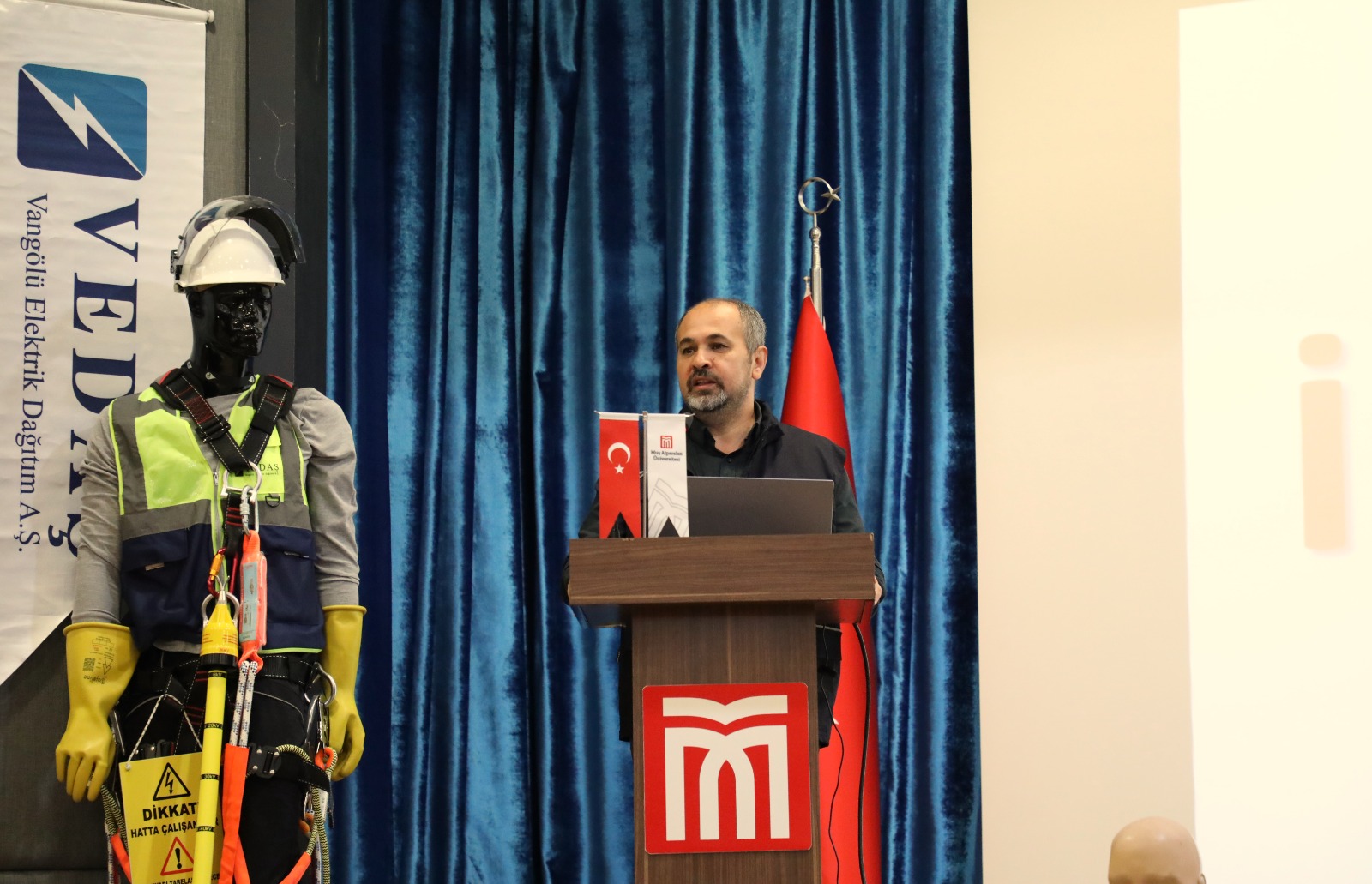
The Basic Occupational Health and Safety Training and First Aid Training program organized in cooperation with Technical Sciences Vocational School (TBMYO) and Van Lake Electricity Distribution Inc. (VEDAS) attracted great attention. The program was held in our University Prof. Dr. Sabahattin Zaim Conference Hall.
VEDAŞ Provincial Director Suat Coşar, VEDAŞ Workplace Physician Dr. Hamit Kasap, VEDAŞ Occupational Health and Safety Unit Manager Emrah Sayılğan, VEDAŞ Occupational Health and Safety Expert Mehmet Salih Timur attended the program to provide training, while our Rector Prof. Dr. Mustafa Alican, Vice Rector Prof. Dr. Yaşar Karadağ, Rector Advisor Assoc. Prof. Dr. Mehmet Özalper, Secretary General Harun Demir, TBMYO Department Heads, Academic staff and students attended the program.
In his opening speech, Prof. Dr. Alican thanked the VEDAŞ Provincial Director and his team and said, "Today, we have come together with you here as part of the Basic Occupational Health and Safety and First Aid Training program organized for the students of Technical Sciences Vocational School. I would like to thank VEDAŞ Provincial Director Suat Çoşar and his team who honored us with their contributions and participation in the realization of this valuable program. In particular, I would like to extend my congratulations to our TBMYO Director Dr. Lecturer Fatih Şevgin, who pioneered the organization of this training, and to our academic staff and students who participated in the program."
Prof. Dr. Alican emphasized the importance of increasing occupational health and safety awareness today and said, "Increasing awareness about occupational health and safety in today's working life is of critical importance for the safety and health of individuals working in every sector. This training program aims to provide our students with basic information on these important issues. Before you step into business life, being knowledgeable and equipped on these issues is important not only for your own safety but also for the safety of the people around you. In addition to being qualified professionals in the field of technical sciences, you will also consciously fulfill your responsibilities regarding occupational health and safety."
Program coordinator and TBMYO Director Dr. Lecturer Fatih Şevgin touched upon the importance of the training organized to reduce work accidents in our country in his speech. Dr. Lecturer Şevgin said, "To express it sadly, our country is in a prominent position in the world in terms of work accidents. Approximately 5 people lose their lives due to work accidents every day in our country. In order to prevent this negative situation, Law No. 6331 was published in 2012 and aims to eliminate dangerous situations or make them less dangerous with a proactive approach. The proactive approach aims to eliminate situations that cause accidents by conducting risk analysis in workplaces. This training aims to raise awareness among our guests about occupational health and safety."
Noting that accident news is frequently encountered in workplaces in daily life, Dr. Lecturer Şevgin said, “Another important issue is first aid. We frequently encounter accident news in daily life. These accidents may include traffic accidents, heart attacks or emergencies such as food or objects stuck in the trachea. First aid knowledge can increase the chance of survival when we encounter such situations. For this reason, we planned these trainings and received support from our expert colleagues. I would like to thank our Rector Prof. Dr. Mustafa ALICAN, our expert colleagues who provided the training in cooperation with VEDAŞ and our valuable guests who participated for their support.”
Within the scope of the training program, TBMYO students were informed by Dr. Hamit Kasap about first aid practices to be applied during the intervention of injured people after accidents that may occur in the workplace, while Occupational Health and Safety Specialist Mehmet Salih Timur provided basic information about the importance of occupational health and safety in working life.
The program ended after students' questions directed to the instructors were answered.